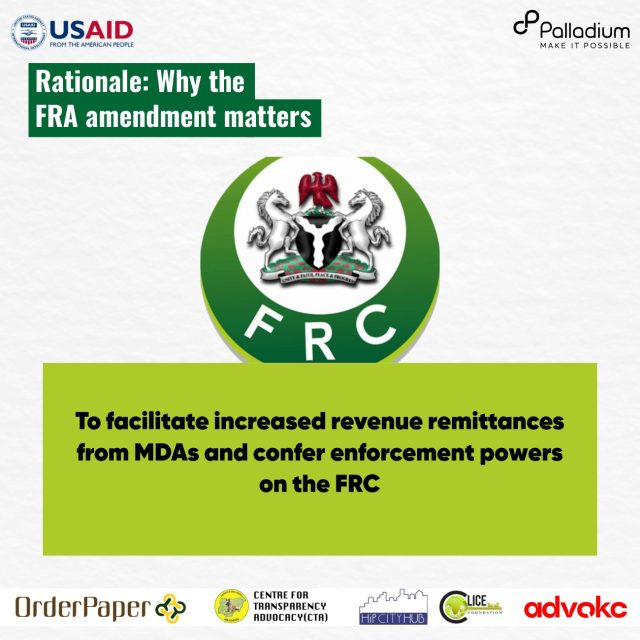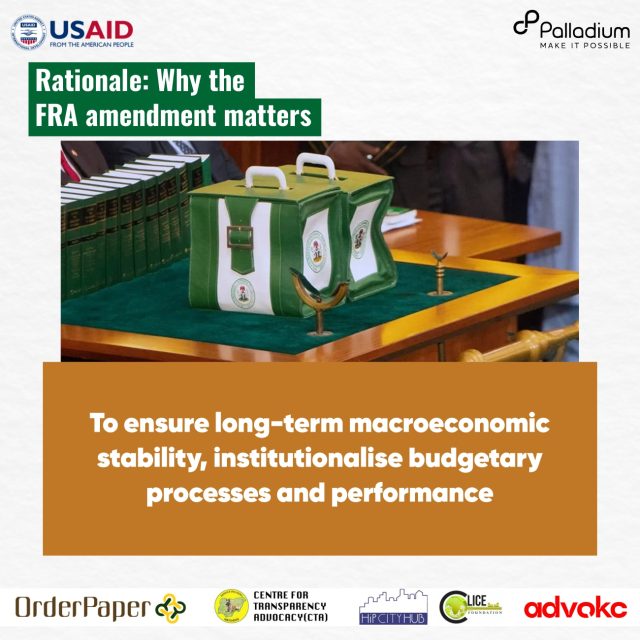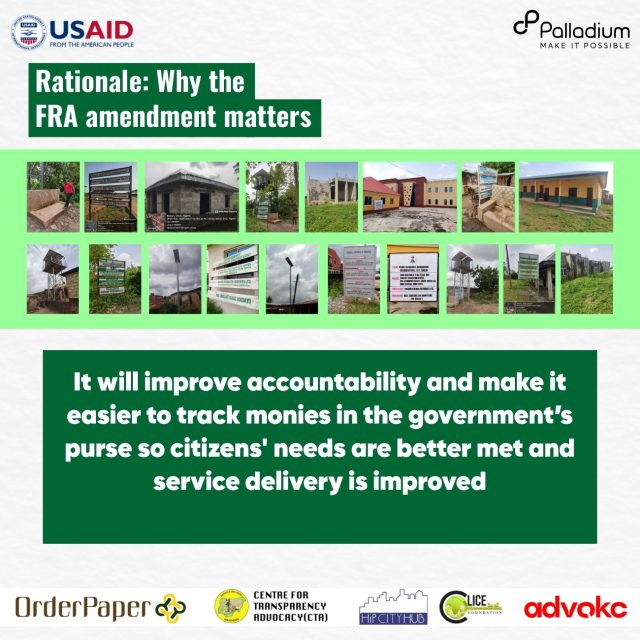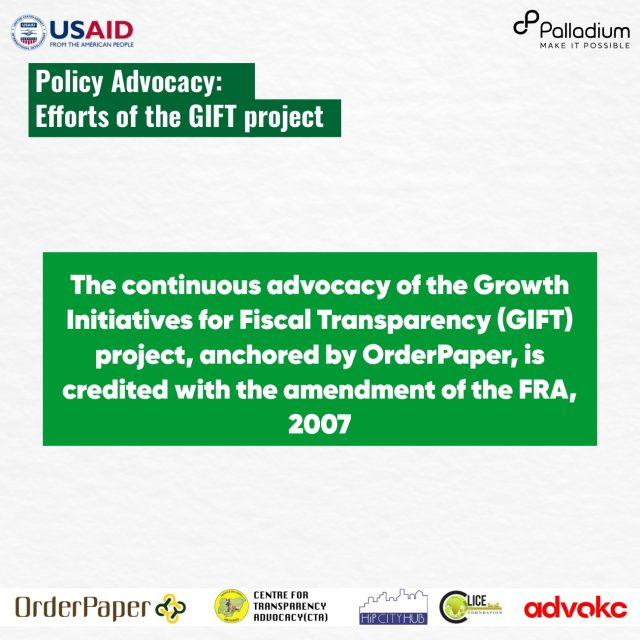From a troubling public debt profile of ₦121.67 trillion to continuous economic hardship, the national assembly’s response to amend the fiscal responsibility law portends relief for a beleagued economy

The Birth of a Legislative Framework
In 2007, Nigeria stood at a crossroads. The country, rich in resources but plagued by fiscal mismanagement, needed a change. In response to this pressing need, the Fiscal Responsibility Act (FRA) 2007 was born. This legislative framework was designed to usher in an era of fiscal discipline, transparency, and accountability, setting Nigeria on a path toward prudent management of public resources at both federal and state levels.
Fast Forward to 2024: with a debt profile of ₦121.67 trillion, public finance mismanagement and lack of accountability continue to mar Nigeria’s fiscal sector and the entire economy. This further amplified the need for urgent fiscal reforms to the FRA 2007 Act.

FRA amendment in the 10th National Assembly
The original FRA, while transformative, has been criticized for its inherent limitations. The growing complexity of Nigeria’s fiscal landscape and the increasing debt burden demanded an update. Hence, the FRA (repeal and enactment) bill, 2024, which came before the 10th House of Representatives on June 5, 2024, aims to address these challenges by overhauling the 2007 Act to curb financial indiscipline, improve public finance management, and align government expenditures with national development priorities.

Currently, the bill that has passed the first reading in the House of Representatives awaits the second reading. The much-needed amendment is in a bid to strengthen fiscal policies and address concerns related to Nigeria’s growing debt burden, among others. Lawmakers and citizens alike have called for its swift passage and presidential assent with the goal to strengthen fiscal policies, uphold accountability, and ensure the prudent management of public resources.
Setting the Stage for Accountability
The FRA’s primary objectives were clear and ambitious. But a key objective of the amendment now being processed in parliament, is the need to empower the Fiscal Responsibility Commission (FRC) with the wherewithal to enforce the act. Other objectives include the following:
Promoting Accountability and Transparency: The Act established strict guidelines for financial management, mandating the publication of financial statements by Ministries, Departments and Agencies (MDAs) and budget implementation reports from the Budget Office of the Federation. This move is aimed to make government financial operations more transparent, accessible to the public, and subject to oversight. The amendment will make it possible for this provision to be enforced.
Maintaining Fiscal Discipline: By setting limits on government borrowing and aligning spending with national priorities, the Act sought to curb fiscal irresponsibility and ensure that public funds were utilized effectively.
Guidelines for Public Borrowing: The Act stipulated that debt levels must remain sustainable, safeguarding economic stability and ensuring that borrowing was undertaken only for capital projects within prescribed limits. The amendment seeks to make this enforeceable.
Coordination Between Government Levels: To ensure consistency and efficiency, the extant Act promotes coordination in fiscal matters among federal, state, and local governments. The proposed amendment reinforces this coordination.
Sanctions and Penalties: The amendment bill outlines sanctions and penalties for non-compliance with its provisions. This includes penalties for unauthorized borrowing, mismanagement of funds, and failure to publish required reports.

READ ALSO: Reps advance bill to create 74 additional seats for women in parliament
Specific Benefits of the FRA to Nigeria and its Citizens
For Nigeria and its citizens, the FRA amendment promises several key benefits, which include:
Economic Stability: The FRA will contribute to the country’s economic stability by preventing excessive budget deficits and ensuring prudent fiscal management, which in turn attracts both domestic and foreign investment and fosters economic growth and job creation.
Reduced National Debt: It will set borrowing limits and ensure that debt is used for productive investments; by doing so, public debt will be kept at sustainable levels.
Improved Budget Management: The amendment emphasizes medium-term planning and performance-based budgeting for more efficient and effective budget management. This ensures that resources are directed towards critical sectors and improving the quality of public services.

Increased Transparency and Accountability: Financial reporting disclosures will enhance transparency and curb corruption, promoting a culture of accountability among officials.
Improved Public Service Delivery: The amendment will ensure that public resources, such as healthcare, education, and infrastructure, are used effectively to improve public service delivery, improving citizens’ quality of life. Better fiscal management leads to more efficient allocation and utilization of public funds.
The GIFT and unrelenting advocacy towards fiscal reforms
GIFT, which stands for Growth Initiatives for Fiscal Responsibility, is a project anchored on advocacy to amend the FRA, 2007. The project’s theory of change is that a significant reduction, if not the elimination of opacity, lack of transparency and accountability, and other forms of corruption through fiscal reforms and prudent use of public resources, including accountable debt management, will lead to efficient, effective, and functional service delivery at the national and sub-national levels.
The GIFT Project is supported by the United States Agency for International Development (USAID) through the Strengthening Civic Advocacy and Local Engagement (SCALE) Project. OrderPaper leads a cluster of Civil Society Organisations (CSOs)- Centre for Transparency Advocacy (CTA), HipCity Innovation Centre, CLICE Foundation, and AdvoKC in implementing this project.
READ ALSO: OrderPaper 4 other CSOs commend Kalu urge swift passage of the fiscal bill

Towards a stable fiscal future
As Nigerians await the amendment and implementation of the FRA 2024, the promise of economic stability, transparency, and efficient public service delivery looms on the horizon. OrderPaper, alongside the GIFT cluster members, continues to take up the mandate to advocate for much-needed fiscal reforms in the country, encouraging the National Assembly to take swift action in the journey of fiscal reform for a more stable economic future for Nigeria and its people.



